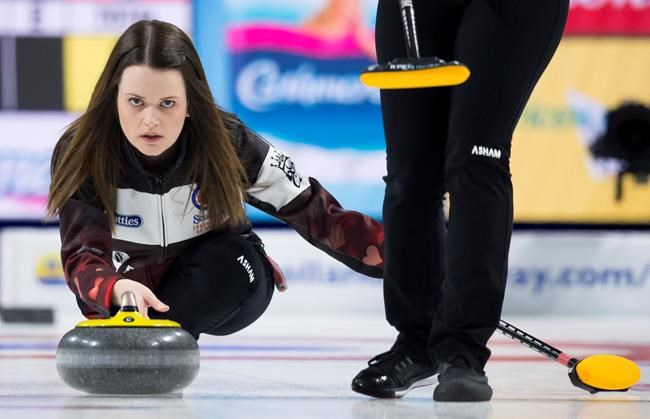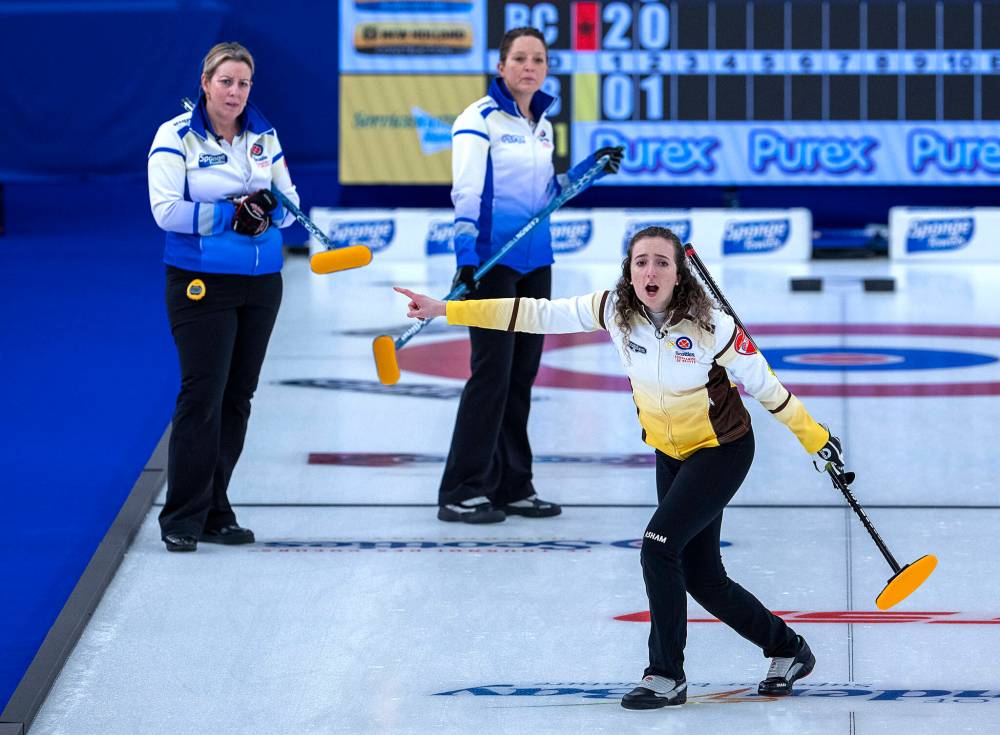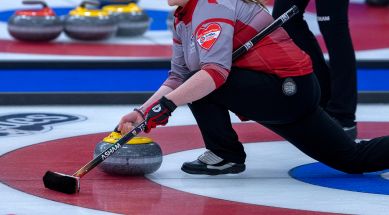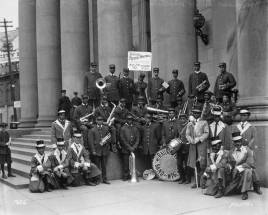Something missing from Scotties Absence of fans strikes at heart of tourney
Read this article for free:
or
Already have an account? Log in here »
To continue reading, please subscribe:
Monthly Digital Subscription
$19 $0 for the first 4 weeks*
- Enjoy unlimited reading on winnipegfreepress.com
- Read the E-Edition, our digital replica newspaper
- Access News Break, our award-winning app
- Play interactive puzzles
*No charge for four weeks then billed as $19 plus GST every four weeks. Offer only available to new and qualified returning subscribers. Cancel any time.
Read unlimited articles for free today:
or
Already have an account? Log in here »
Hey there, time traveller!
This article was published 31/01/2022 (1060 days ago), so information in it may no longer be current.
It’s not the same without the moose calls, or the signs with glitter paint and heart-shaped stickers. Not the same without the hats that look like curling rocks or the giant cardboard cut-outs of players’ faces. And it’s definitely not the same without the names of provinces, shouted over the ice with gleefully elongated vowels: “Manitooooooooba.” “Ontaaaaaaario.”
Still, it’s live curling, so that’s something, especially after two months in the middle of the season without it. And the 2022 Scotties Tournament of Hearts is, once again, full of Manitobans, with three teams playing out of the province as well as a wayward daughter in 2014 Manitoba champ Chelsea Carey, now representing Saskatchewan.
So there’s a lot to cheer for, as the national women’s championship plays out this week. But that’s not to say it’s the same.

To be fair, the Scotties in an Olympic year always feels a little soft, sandwiched as it is between the white-knuckled intensity of the Olympic trials and the knowledge that, with the post-quadrennial offseason coming — “broomspringa,” as my friend, American curling writer Matt Sussman, calls it — some of the teams will announce their dissolution within weeks.
So it isn’t surprising that the first four days of play in Thunder Bay felt a little loose, a little anything-goes, as the broadcast crew talked up the efforts of Team Homan (minus Rachel Homan, Olympic mixed doubles) and Team Fleury (minus Tracy Fleury, COVID-19, though she’s expected to be back in the hack this week).
There’s been a lot to satisfy fans, though. There has already been a controversy worth chewing over: on Monday, a Nunavut player fell in the house and burned a few rocks; the umpire determined it to be a steal of three for Northern Ontario, but the fairer call would probably have been a steal of one. There have been funny moments, and some great early games.
The sport doesn’t have a massive fan base, but it does have a fervent one that is deeply woven into its world. The applause for every team’s tricky takeout, the crowd’s crescendo murmur as a critical draw crawls towards its spot; these are as much a part of a game as the rocks.
But without the fans in the building, it just cannot be the same. It was an unavoidable decision by Curling Canada to tighten the bubble, given the Omicron bath the country has been taking, but still, to make it for the second year in a row stung: one more Scotties without that life, that colour, and that famously folksy fan culture.
It’s a loss, in a way that isn’t quite the same as with other sports, because curling is not quite like any other sport. It’s more cerebral and less intuitive than most. Mostly, though, it’s at a fairly unique crossroads: still technically amateur, with all of the intimacy that holds, but with more attention in Canada than most amateur sport, and creeping closer to pro.
Curling depends on that retained intimacy, perhaps more than any other sport of its level. The sport doesn’t have a massive fan base, but it does have a fervent one that is deeply woven into its world. The applause for every team’s tricky takeout, the crowd’s crescendo murmur as a critical draw crawls towards its spot; these are as much a part of a game as the rocks.
In the same way, the heart of a national experience — for both fans and players — isn’t just the results. They are the point of it all and the focus, but the lifeblood of a Scotties is everything that happens around and outside the ice. It’s the nights at the Patch, for teams out of contention or never quite in; it’s the autograph sessions, the banquet, the pictures with fans.
The sport needs that. The Olympics have been a massive boon to curling — clubs across the world are preparing for an influx of curious participants that follow each Olympic tournament — but so is its atmosphere and word-of-mouth. The game draws new fans to take a closer look, but they often stay for the friendly, never-too-serious quirks of its culture.
Curlers are missing that part this week, for sure. Consider the case of Mackenzie Zacharias: at just 22, the 2020 world junior champion and Altona phenom is already playing in her second Scotties. But she has yet to have the “real” experience, having made both of her national visits to the COVID-19 bubble, forging a quiet week between the hotel and the rink.

“The fans are usually so close, and getting to sign autographs, we really like it,” the skip says, chatting over the phone after a Tuesday morning loss to Northwest Territories veteran Kerry Galusha. “Getting to interact with people is kinda cool. We got a little bit of that at (Olympic) pre-trials, which is nice. But unfortunately, not this year. Hopefully in the future.”
She tries to look on the bright side. In “normal” years past, many Scotties rookies have told me they felt overwhelmed by the need to balance both on- and off-ice events. As Zacharias sees it, her team will go into any future Scotties — you know they’ll be back — with the benefit of confidence at managing the “play” part of the equation, and ready to embrace all the rest.
She looks forward to that, she says. She would love to be able to sign autographs, and to work the phone banks that are set up at the arena in normal years for the annual Sandra Schmirler Telethon, which raises money to buy NICU equipment for hospitals. She’d love to get involved in all of that stuff that makes big curling events more like a village, than a sport.
“… to hear the crowd cheer for any shot whatsoever, it just changes the whole dynamic. We go out there right now, and it’s dead silent. That’s okay, it’s like playing in a curling rink. But to have the fans there to really hype you up, it adds a lot to the game.”
– Mackenzie Zacharias
“That’s a huge part of the Scotties,” she says. “The curling would 100 per cent be our focus… but to hear the crowd cheer for any shot whatsoever, it just changes the whole dynamic. We go out there right now, and it’s dead silent. That’s okay, it’s like playing in a curling rink. But to have the fans there to really hype you up, it adds a lot to the game.”
Social media, at least, provides additional outlets for that sort of closeness — so far, the buzz of the #Twitterspiel this week has been admiring the elaborate snacks that usual Team Mike McEwen lead and trained chef Colin Hodgson has prepared for Team Chelsea Carey, in his spin as coach — but still, as long as there are no fans in the building, something is missing.
Maybe it’ll be able to come back in March, just in time for the Brier. Whenever it happens, it won’t be soon enough.
melissa.martin@freepress.mb.ca

Melissa Martin
Reporter-at-large
Melissa Martin reports and opines for the Winnipeg Free Press.
Our newsroom depends on a growing audience of readers to power our journalism. If you are not a paid reader, please consider becoming a subscriber.
Our newsroom depends on its audience of readers to power our journalism. Thank you for your support.








